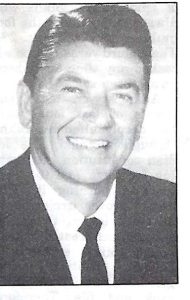
Washington: President Reagan said Monday he is ready to agree with the Soviets on a permanent ban on underground nuclear tests, but not until the United States ends its next round of experiments and catches up with the Kremlin.
The president commented in response to a question about the Kremlin’s announced plan to begin a temporary moratorium on nuclear testing Tuesday the 40th anniversary of the United States’ dropping of the atomic bomb on Hiroshima, Japan.
Asked why the United States had refused to go along with the Soviets’ request that the United States join in a ban on testing until the end of the year, Reagan said the Russians are ahead of the United States in the modernization of nuclear weapons and have completed their tests, “so asking us to make it mutual means we would not catch up.”
But Reium, which is supposed to end around December something, if they want to make that a permanent moratorium, or if they want to agree with us and have bilateral inspection of each other’s testing, we’re willing to do that.”
“When we’ve completed ours (tests) and they’re not doing any more, yes that would be fine,” he added.
The United States has never before proposed a permanent ban on underground testing. The United States and Soviet Union agreed in 1963 to ban nuclear tests in the atmosphere, and underground blasts are the only way for both sides to test new atomic weapons or check whether aging explosives are still good.
While the Soviets have finished their tests on modern weapons, including the SS18, “which is comparable to our MX,” Reans of that same type to keep pace with them.”
Reagan also said the United States still has to do some testing for the so-called Midget man, a smaller single warhead missile now under development, to match the Kremlin’s tests for their new SS24 and SS25 missiles, “and we haven’t even come to that stage yet.”
Soviet leader Mikhail Gorbachev announced the temporary testing moratorium last week and suggested the United States make it mutual.
Reagan’s national security adviser, Robert McFarlane, branded the move as a “propaganda” ploy and, in a counterproposal; Reagan has invited the Kremlin to send observers to the next U.S. tests.
The United States has not proposed a permanent test ban in the past on grounds that verification procedures are not adequate without onsite inspections, officials said.
The 1963 Test Treaty, outlawing Ban atmospheric nuclear tests, was signed by President John F. Kennedy and Soviet leader Nikita Krushchev amid growing international concern about the health effects of fallout.
France, China and India have conducted atmospheric tests of nuclear devices since, but the two superpowers have confined their development activities to underground experiments.
Article extracted from this publication >> August 9, 1985
Article extracted from this publication >>